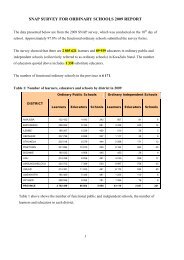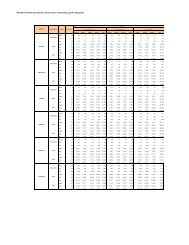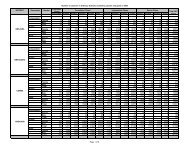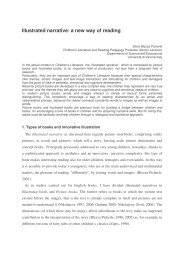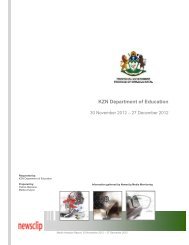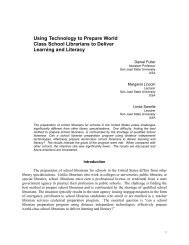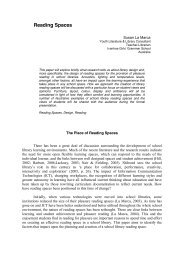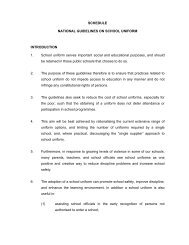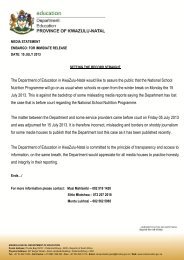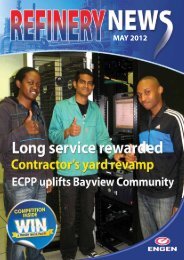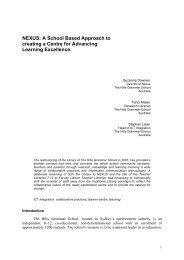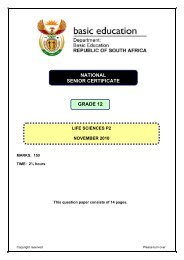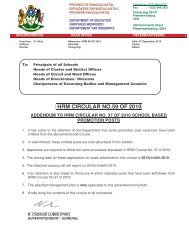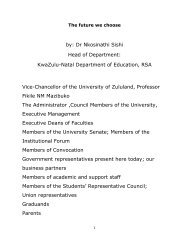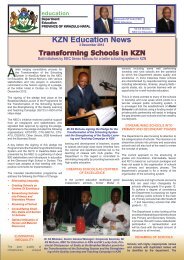History P1 Feb-March 2010 Eng Memo - KZN Education
History P1 Feb-March 2010 Eng Memo - KZN Education
History P1 Feb-March 2010 Eng Memo - KZN Education
Create successful ePaper yourself
Turn your PDF publications into a flip-book with our unique Google optimized e-Paper software.
<strong>History</strong>/<strong>P1</strong> 4 DoE/<strong>Feb</strong>. – <strong>March</strong> <strong>2010</strong><br />
NSC – <strong>Memo</strong>randum<br />
2. EXTENDED WRITING<br />
2.1 The extended writing questions focus on one of the following levels:<br />
LEVELS OF QUESTIONS<br />
Level 1<br />
Discuss or describe according to a given line of argument set out in the<br />
extended writing question.<br />
Plan and construct an argument based on evidence, using the evidence to<br />
reach a conclusion.<br />
Level 2<br />
Synthesise information to construct an original argument using evidence to<br />
support the argument.<br />
Sustain and defend a coherent and balanced argument with evidence.<br />
Write clearly and coherently in constructing the argument.<br />
2.2 Marking of extended writing<br />
<br />
MARKERS MUST BE AWARE THAT THE CONTENT OF THE ANSWER WILL BE<br />
GUIDED BY THE TEXTBOOKS IN USE AT THE PARTICULAR CENTRE.<br />
<br />
CANDIDATES MAY HAVE ANY OTHER RELEVANT INTRODUCTION AND/OR<br />
CONCLUSION THAN THOSE INCLUDED IN A SPECIFIC EXTENDED WRITING<br />
MARKING GUIDELINE FOR A SPECIFIC ESSAY.<br />
<br />
WHEN ASSESSING OPEN-ENDED SOURCE-BASED QUESTIONS, LEARNERS<br />
SHOULD BE CREDITED FOR ANY OTHER RELEVANT ANSWERS.<br />
Global assessment of extended writing<br />
The extended writing will be assessed holistically (globally). This approach requires the<br />
educator to score the overall product as a whole, without scoring the component parts<br />
separately. This approach encourages the learner to offer an individual opinion by using<br />
of selected factual evidence to support an argument. The learner will not be required to<br />
simply regurgitate "facts" in order to achieve a high mark. This approach discourages<br />
learners from preparing "model" answers and reproducing them without taking into<br />
account the specific requirements of the question. Holistic extended writing marking<br />
credits learners' opinions supported by evidence. Holistic assessment, unlike content<br />
based marking, does not penalise language inadequacies as the emphasis is on the<br />
following:<br />
<br />
<br />
<br />
The construction of argument<br />
The appropriate selection of factual evidence to support such argument and<br />
The learner's interpretation of the question<br />
Copyright reserved<br />
Please turn over



